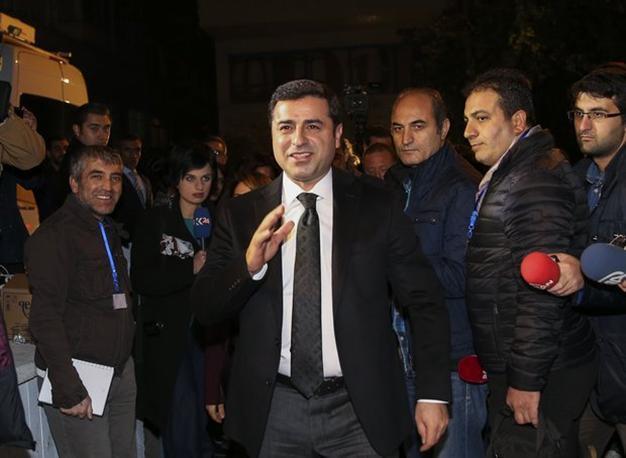Elections held under unfair conditions: HDP co-chairs
ANKARA

AA photo
The Nov. 1 elections were conducted under unfair conditions that included violence and massacres, the Peoples’ Democratic Party’s (HDP) co-chairs said in their first evaluations of the polls, in which their party just squeaked over the 10 percent electoral threshold.The HDP was subjected to unfair, unfree and unequal conditions during the election campaign, HDP co-chair Selahattin Demirtaş said at a press conference outside the HDP headquarters in Ankara after the unofficial announcement of the Nov. 1 election, while noting the pressure the HDP had been under during the five-month period until Nov. 1.
“This five-month period [since the June 7 election] was full of unequal, unfair and extraordinary conditions for the HDP’s election campaign,” said the HDP’s other co-chair, Figen Yüksekdağ.
Demirtaş said the high rate of participation in the Nov. 1 election was pleasing. “I would like to thank all those who voted for the HDP,” he added.
“We waged no campaign. We only tried to save our people from massacres. Nearly 11 percent of the vote is not an outcome of a proper election campaign,” Demirtaş said, recalling deadly bombings both in Ankara on Oct. 10 and the southeastern district of Suruç on July 20.
Reiterating that the HDP was the party that had faced massacres, Demirtaş said: “If those bloody policies had been implemented against another party [instead of the HDP], they would have been ruled out of politics,” referring to the Justice and Development Party (AKP).
“Although we lost around a million votes, the HDP has won a big victory because the number of voters has risen in this election,” Demirtaş said. “I would like to thank all those who stood by us [despite] this bloody policy.”
Demirtaş said the HDP, as the third biggest party in the new parliament, would continue to stand resolute for Turkey’s future.
Yüksekdağ, meanwhile, said her party had witnessed a surprising and positive outcome from the June 7 election but that subsequent political developments had produced a snap election.
“The five-month-period from June 7 to Nov. 1 was an abnormal period, so we could not evaluate this period independently,” Yüksekdağ said.
Yüksekdağ said those in power had ratcheted up tension since June 7 and that it was the HDP which faced the harshest conditions in the subsequent period.
The HDP had already waged its election campaign under pressure before the June 7 election, she said, noting that that pressure had increased since then.
Touching on the massacres between June 7 and Nov. 1, Yüksekdağ said 258 civilians had lost their lives, 33 of whom were children.
“Around 500 HDP members and officials were arrested, and 190 HDP offices were attacked,” Yüksekdağ said, adding that most of the violent acts the HDP faced occurred in provinces that are largely inhabited by Kurds.
The success the HDP scored in the Nov. 1 election was a success for all people who continued the struggle despite the pressure against the party, she added.
Meanwhile, police fired tear gas at HDP supporters outside the party’s headquarters in the southeastern province of Diyarbakır during clashes after the initial election results were announced, according to reports.
















